Rudy Hatfield: It’s time for somebody else to take my spot
Ginebra power forward Rudy Hatfield surprised everyone when he announced that he was retiring from the PBA. At 35, he still has something to offer his team and is definitely still an asset. However, Rudy has decided that it is time for him to hang up his sneakers to be with his family and pursue other things.
Chino Trinidad caught up with the “H-Bomb” to talk about life after basketball. During the interview, Chino finds out that not only has Rudy prepared for his retirement, he is looking forward to it. Find out what his plans are for his family, what he has learned during his time in the PBA and in the Philippines, and what he means when he says he’s “ministering people” in his interview with “Sports Pilipinas.”
Read the full transcript below.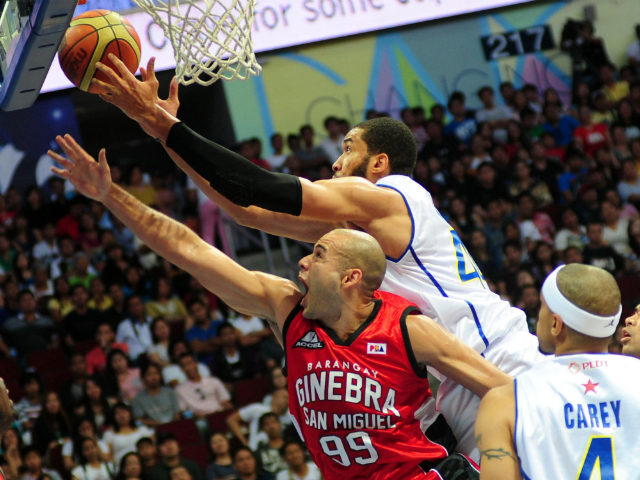
On priorities
Chino Trinidad (CT): So, Rudy, is this goodbye?
Rudy Hatfield (RH): Goodbye as a player, but never goodbye forever. In some ways... A lot of thought, a lot of decisions to go over and went through... I know it’s my time. The things lined up. I have a spiritual side that I need to fulfill, just as far as the physical aspect of the game for me, and as well as my personal side. Those three sides aligning says it’s my time.
CT: End of the day, it's family always comes first, yeah?
RH: Yes, absolutely. You know, the girls at home, they missed so much of their father. I missed out on their lives so that's definitely always been in my mind. It always is what we were able to sacrifice a lot for it, through the years and they were good for a while but then eventually you have to make that decision... How many chances do you get to see your kids grow up? Where are your priorities? Family... God first, then family, then basically everyone else, then career for me.
CT: Great equation. A lot of times, people would say, “I have to take care of my career because I need to take care of my family, pray to God that God completes whatever is lacking in the equation.” But clearly, you go God, Family, Career. Was this a realization recently, or was this the journey for you, Rudy?
RH: I would say recently, maybe three years ago. To that reason, I really found (inaudible) when I went back to the States. Maybe a little bit more, more like five years. When it came to that point, what you have to understand is, if you take God as the one that gives you everything... Basically, if you want to compare it career-wise, no matter what happens in your job, if you lose (it), if you're relying on your God, you'll find another job. But if you rely on your career, you might not find another career.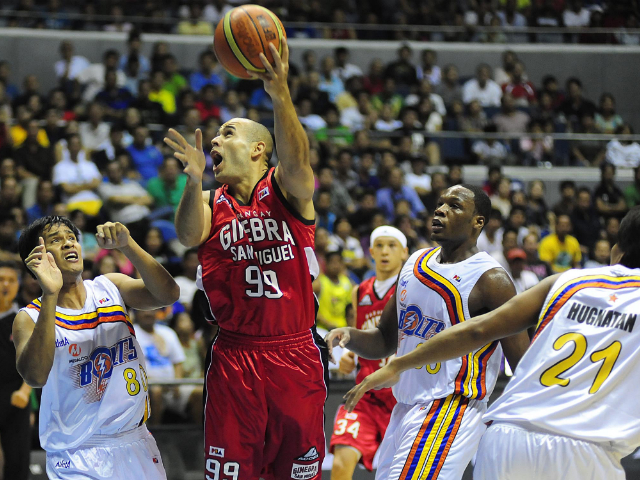
On finding God, blessings, and opportunities
CT: A lot of people, they cling on what God promises everyone towards the end of their careers or when they are like at the edge of the cliff. But you found it much, much earlier, which is what's coming out from deep inside.
RH: Yeah, yeah. It's a blessing, and unfortunately I found it as early as I found it. It would've been nice to find it earlier. You know, because there's a lot of heartache and at a lot of times you have to hit rock bottom to find that kind of place. I was blessed to not actually have to go rock bottom but there were hard times to discover that and when you find something like that, you rely on something greater in the world, that whatever happens in this world, you feel secured.
CT: You feel secured, yeah. That's who you are. You're a person I can sense that is full of himself, he knows what to do, with God on his side. Was this a... Is there a proverbial thing they say when God closes the door, God opens windows for you? Was this a classic case for you, seeing it career wise? It's not gonna be there forever, but it hasn't closed, yeah?
RH: No, it hasn't closed. And as a matter of fact, literally ten minutes before I came here, I had my... Spoke with RSA about things and the first thing he said was, “This is not over. You do... You go see your family, take care of what you need to take care of. If for whatever reason, it's not working, you come back.” And they have been... Ginebra and the whole San Miguel Corporation has always been understanding of my situation, and so supportive of everything, and always been like that with me. It's absolutely been a blessing to just be a part of all this.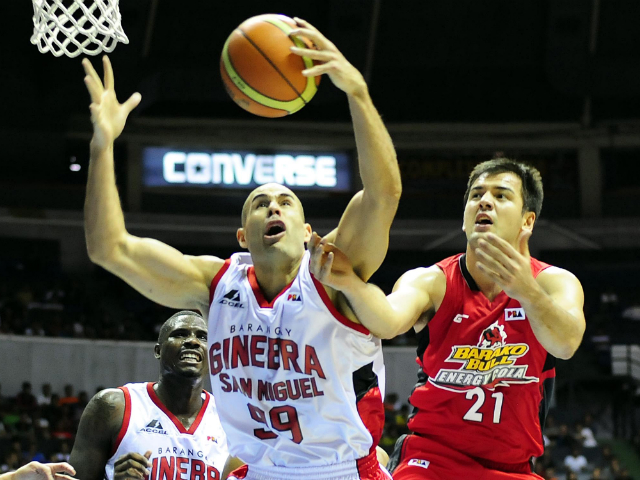
“It took me a while to realize how kind my Filipino people are”
CT: The good thing about what you’ve been through, when you first came in, we were younger back then... 1998 was, I think, the first time I saw you out of Michigan, coming to the Philippines. 15 years you've been here. What is it that you've missed? I mean, you're looking forward to be with the girls, the two girls, but what is it that you might miss? Something you look forward to early in the morning, something that... We tend to say that we've moved on but we tend to look back and miss the days. What is it that you might miss?
RH: Man, there's a lot of things. I never... I don't think I'll ever regret leaving the game because I put everything into it. I've fulfilled more things than I ever dreamed of and I know I left everything on the floor. It took me a while early in my career, (I’ve) not been the nicest person, but after a while... It took me a while to realize how, just how kind my heritage culture is, my Filipino people are.
CT: So the first time, you were struggling with the acceptance, accepting people...
RH: I was more arrogant than that. You know, I'm an independent person, I'm very independent...
CT: You were suplado.
RH: You get into the ball in the PBA, and the “basketball player” [tag] hits you quick, and (you have to) handle it right away. Finding God allowed me to understand (that) people are actually inspired by some of the things you do. The purpose of you doing something; it's not for you, it's for everyone else. They recognize that. Just, the people love what you do, and I'm not gonna lie, there's still some days when I just, it's hard to handle certain things, going out all the time, not having that privacy. But those are few and far in between, and I've gotten a lot better in accepting that. Because I think about it as if I have a problem, somebody who, maybe if I kinda learn some things from (somebody) and I want to learn more things, I would want to say ‘hi’ to that person and walk them in and just understand them. So I guess the biggest thing I've learned is kindness of the people, and learning more about my side and growing. I didn't have that many friends other than my family and my cousins, but then even then they're pretty...
CT: And they're like, scattered all over the place. This was your baptism of fire on what Filipinos are.
RH: Yeah, I have a few things, like the food. My Lola makes that.
CT: But lumpia, pancit, these things, it's so superficial. But what you've learned, something that, if there's one thing that you've learned from this experience, from the Filipinos, is that you will bring back and teach your girls and teach the people whose lives you will touch most definitely, what is one trait that you will be taking with you as you, I don't want to say goodbye, never goodbye, but what is it that you'll take with you and something that you'll treasure, something that you'll (inaudible) the rest of your life? Is there something uniquely Filipino that you've learned (in the) many years you've been here?
RH: It's the family unit of the Filipino culture. For sure, in the States especially my, you see that there are a lot of families that are broken, and once the kids grow up, they're gone. You don't talk to parents that often anymore. Instead, (there’s) unity of family, even those who aren't blood family, you can still be family. And actually my daughter, the mother of my daughter, we talked about that a lot. Even the families so close together they're always arm in arm together, always batting for each other, and just living together for all time. It's something I experienced a little bit but not so much in the United States and that is definitely one thing. Of course, the love and the intensity and anything that's basketball, it's everything passionate.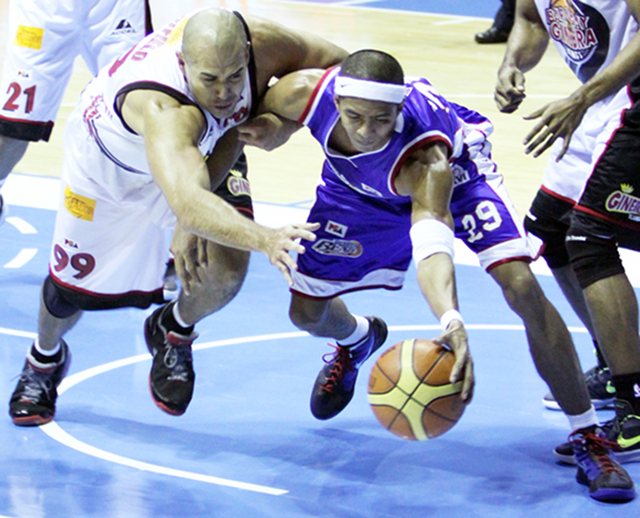
On not being a naturally talented basketball player
CT: Let me ask you this one. You came in here you brought energy, you brought something into the game. If there's a ball that's ballin’ you probably see Rudy just diving for it. And your energy was just so contagious and that's what people... I was reading through a lot of messages of saying goodbye and thank you, and they can't thank you enough for the energy that you brought to Philippine basketball. Is it something you were born with (or) something you acquired?
RH: I actually have a pretty (inaudible) story. When I was a kid, I only played one year of high school basketball. I got cut (the) first two years. So I played one year in high school. When I was growing up, I was maybe 5'6" as a fourteen year old, 5'6", 205 pounds. I was the big kid so I kind of stretched over the years and I kinda grew, and I never really had that toughness. But it really wasn't until I started playing football in HS when I got that kind of (inaudible) my basketball career is based on. I was not talented as a basketball player. I wasn't gifted. I'm not one of those guys that are Danny Siegel, Mark Caguioa.
CT: It makes it so easy.
RH: They walk on the court and it's home to them. This is what they do (to) me, the only way I can see was I have to work harder than everyone else. And when it comes to the game, I want to be as fresh in the end of the game, like at the start of the game. And I learned a lot, and I give a lot of credit to one person who really helped me in my career, Eric Menk. I got a (inaudible). Basically all my, I have to do extra work from him and... But the thing is, he had the talent to go along with that which, myself, I did what I did. There was a time when I didn't think that I will get it. I haven't had plays drawn up for me when they touched the battle. I have to go get it myself.
CT: It's always hard work. You have to work for it. You literally...
RH: I enjoyed that role.
CT: That's who you are.
RH: I enjoy the blue collar worker role, that's my lifestyle.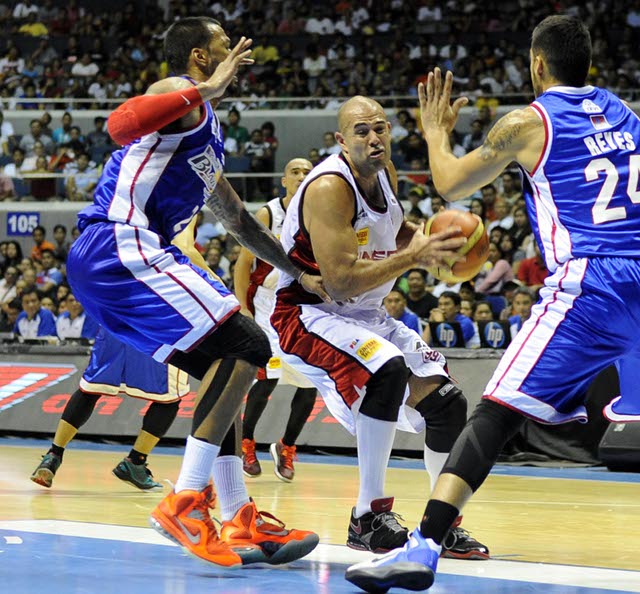
“This is not the end of life, it’s just the next chapter”
CT: Going to this thing, a lot of people will say it's tough to say goodbye to something that you've grown to love. You see the Eric Menk's, Asi Taulava. Asi found his fountain of youth at 40 years old. Come on, it was like yesterday when we were in Italy and all those places, that was 2002, you were much younger guys, Asi Taulava. Tell me, but unlike them, when you said “this was it,” you said goodbye, you were so sure of what life was gonna be after basketball.
RH: Absolutely. The confidence of knowing that this is not the end of life, it's just the next chapter. Because I have my confidence in God and what he's got for me, it's easy for me to actually move on to that work. But I thought long and hard about this. This isn't just a whim decision. Knowing what I put into it and knowing that there's a time when... Basketball isn't so much giving back at this age for me, and Asi, you guys, always been like that. He's just an amazing player but you know, like I said, it's just my time and it's the time for somebody else, hopefully, to take my spot. I love the young players.
CT: That’s (the) unselfish side of you. You have stayed for (inaudible) but instead of clinging on to that spot, and maybe not allowing someone to pop and take this place, you more than gladly gave a spot to that next guy in line.
RH: And that's what I mean. Basketball gave back to me so much. The game, the people, everything about it just gave back to me. So I'm happy knowing that there's some kid out there that can actually have that spot, especially about the Fil-Am rule right now and everything like that, that I take the extra spot that could be open for another person coming in and do what I do, and even better. And in the next generation, just seeing that everyone can do that, it's just what the game is about. You want the game to become a legacy. It continues to grow and grow and you can't do that if you're trying to hold on to something and bringing it, not say down, but you know, not allowing it to excel when it should. I hope there's a new guy that can come in and (take that) spot, and I want to see them grow and become better.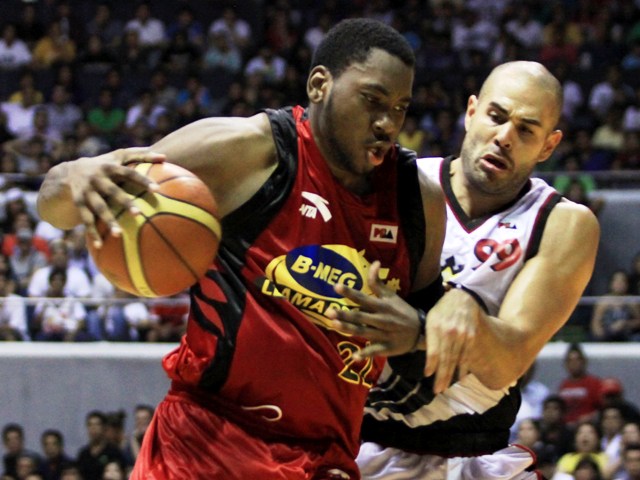
On his divorce, trying to work things out for his family, and “ministering” people
CT: That's the great spirit of sharing which is definitely in you. What this journey is all about, you might be leaving the basketball court, but you are entering into God's playground, a different course, maybe a bigger field for you, and then you can use the kind of energy God has blessed you with. You can talk, you can infect people with your energy, is this where it's headed? People would say, “Oh he's taking, he's becoming a minster,” and all that, but where are you really headed? This one, after you've settled with the girls, where is God leading you?
RH: Well, thankfully not too many people know this. Some do. But I got divorced a year ago, and how God works, we needed the time away for us to work things out. So that's just another amazing story that I got into. So being back with my entire family, now we are planning on putting together a business to work on back in the states, and move forward like that, so that's just too inspiring.
CT: Where is God leading you? I mean, you can always feel this. You know you have a sense of this, that it's not you taking control of your life. One of a higher power is controlling it right now.
RH: And people are thinking about that, being a pastor, and getting into ministry. Being in ministry isn't just about joining any kind of church, if you’ll be a minister.
CT: What you're doing now is ministering people.
RH: It doesn't matter where you are. A good friend of mine, Alex (inaudible) said that you can always walk up to anybody and (say), “I'm about to pray, I'm gonna build my relationship with God, is there anything I can pray for you about?” Just doing that to anybody in the office is ministering. So as far as going into a pastoral service, I don't know if I'm ready for that. I don't even know if that's my calling. But I’m not worried about that thing because you can minister anywhere you are. I am confident in anything. Like this job, rising again. If that doesn't work out, then that's not the door that God has opened.
CT: Yeah. The most important thing is not everyday, (not that) the marriage is broken. I mean, it’s everyday, it happens. But it is not everyday, it is meant to be mended. I mean, working towards getting together not just for girls, but for a higher calling.
RH: Absolutely, yes. This is the thing, I can briefly run through that story. What happened was, as we were having some issues, there was a point (that) we almost (did not) want to talk to each other. This is recent, because of the way things happened. We’ve always been respectful (towards) each other. Suddenly, I read in 2 Corinthians, the passage, it says if a wife leaves her husband she should remain single or reconcile with him. Basically, the husband should do the same thing. And when I read that, I did not only make a vow to her, I made a vow to God. And when you make a vow to God, this is more than marriage between two people, it’s a marriage with God, within us. So no matter what happens, I'm going to wait for her, and I will do whatever I can, until she decides to move on and get married. When she does that, then maybe I'll move on. But until that day, I'm just (going to) continue to focus on her. And I'm telling you, the next day, when I spoke to her and she called me and she's having issues with (inaudible) company she was with, and she told me, “You've always had my back, you've always been there, even (when we) weren't together and I love you for that.” And as soon as I put that in my mind and in (my) heart, that's where we start working things out. Literally, it's just submitting yourself to something and knowing (that) I'm really giving in to this because this is what you know is right and that's (when) things seem to work out.
CT: How I wish a lot people, maybe younger couples would be able to hear your story, would be able to tell your story. Alex had said, you don't have to be a pastor, you don't have to be a minister to be able to tell your life’s story and maybe teach this world how to make things work. You're in the midst of this, and your proof positive that it can be done. (inaudible) Yeah, you can argue, but you can be respectful. That's the essence of life.
RH: Yeah. That is. It's definitely respecting, even if... The thing is, it’s so easy. God even says it’s easy to like your friends, its easy. Like the people that are nice to you, good to you, even (the) devil and demons do that. It’s hard to like someone that you are angry with, or that is your enemy, or somebody you don't like. It is when you like those people, that's (inaudible) about God. And you know what, I know I'm kinda preaching here, I want to make it clear that I make mistakes left and right like crazy, I do damn things all the time. So I'm not trying to say that I'm holy or anything, so people know that I, of course you could see on the court, watching replays, yelling at referees, you could see me. I used to talk a lot but that doesn't mean you still can't be a follower of God. That is what it’s about. That's how you learn.
CT: Once you leave the court, it’s God's son, actually. It's part of who you are. It's your passion. It's your energy. It's you being a competitor. But after all has been said and done, respect.
RH: That's it. Respect, in the end. That's the most important thing.
CT: And I respect you for doing this, and all my prayers (are) with you. Wherever you're headed, remember, this is home. And you’ve got home back there. Anytime. We Filipinos, we're brothers. And don't be suplado next time I see you.
-Grace Gaddi, GMA News




